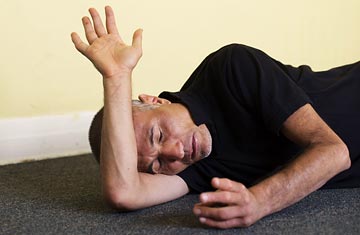When In Doubt, Ask A Family Member
I learned a valuable lesson recently about how difficult it can be to make the correct diagnosis when you see a patient for a very short period of time. In the acute rehab setting I admit patients who are recovering from severe, life-altering brain events such as strokes, head injuries, and complex medical illnesses. It is challenging to know what these patients’ usual mental function was prior to their injuries, and so I rely on my knowledge of neuroanatomy, infectious disease, and pharmacology to guide my work up. However, I have learned that asking the patient’s family members about what they were like (in their healthier state) is extremely important as well. Personality quirks, likes and dislikes, and psychiatric history all offer clues to ongoing behavioral challenges and mental status changes.
This fact was never clearer than when I met an elderly gentleman with a new stroke. He was extremely drowsy, non-participatory, and was not oriented to anything but his name. The stroke had occurred in a part of the brain that does not affect cognition, so I began to wonder if he had an infection or was having a reaction to a medication. I carefully ruled out all possible sources of infection, and I combed through his medication list and removed any potentially sedating drugs. His mental status remained unchanged for several days. I then began to wonder if perhaps he was suffering from significant dementia at baseline, and that he was living at home with more help from his family than they had initially reported. The therapy team and I began to consider a transfer to a nursing home. The family was horrified by the idea.
As it turned out, his grandson shared with me that he believed that the patient was autistic. Because his grandpa was elderly, he grew up in a time where not much was known about autism, and diagnoses of the condition was rarely made. He was therefore never formally diagnosed, but had many of the textbook characteristics. His stroke, combined with a sudden transfer to an inpatient hospital setting, was very distressing for the patient, and he had shut down to protect himself from the mental anguish. The “dementia-like” behavior that we were witnessing was merely an acute psychological reaction.
Armed with this new information, the therapy team requested family members to be present during all sessions – to encourage participation and to provide comfort and normalization of the transition from home to hospital. The patient responded beautifully, and made remarkable gains in his ability to walk and participate in self care activities.
I apologized profusely to the family for our period of confusion about his diagnosis and care needs, and offered reassurance that we would do our very best to help him recover from his stroke so that he could go home directly from the hospital. He did in fact return home, and with a little extra help from his daughters, he is enjoying his usual projects and activities.
As for me, I will never presume dementia without careful family confirmation again.













